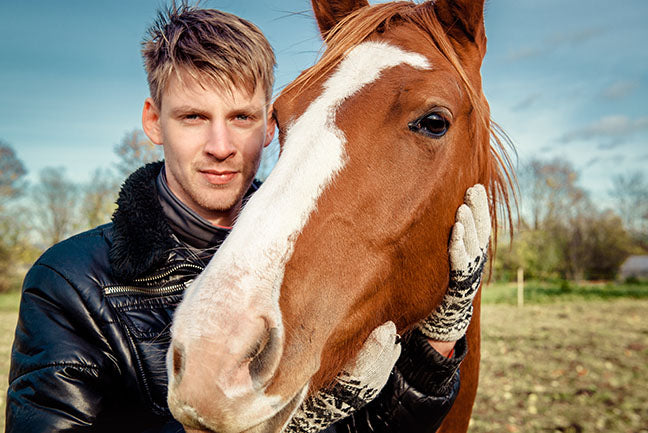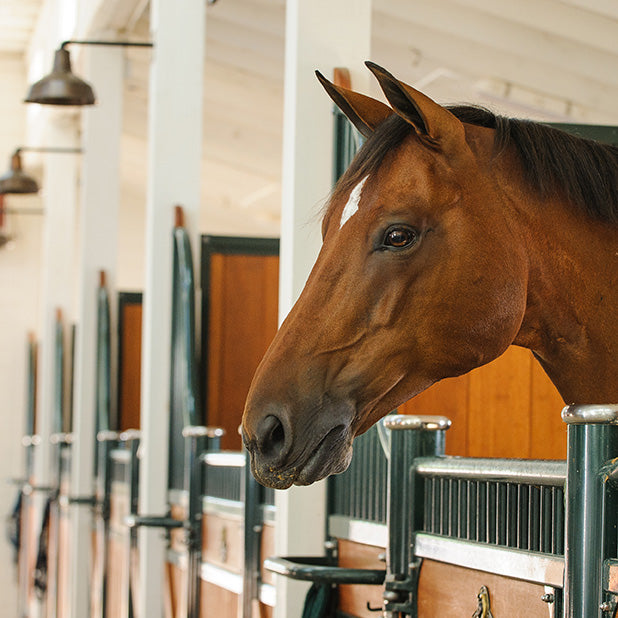We humans are amazing animals. With our consciousness, drive, intelligence and stamina, as well as our ability to conceptualize and plan, we accomplish great things and have thus made our mark on the planet (for better or worse...).
Yet, we still feel puzzled by our horses.
- Why can we not achieve our training goal?
- What is the reason for the 'mystery lameness' or
- simple unwillingness of the horse to perform to the best of his abilities?
Being the true humans that we are, goal-oriented can-do attitude and all, we usually turn up the 'chatter', involve different or more specialists, various techniques or gadgets and
DO, DO, DO, DO... What is my point? I believe the answer to the above questions can—many times—lie in a different mode of operation. As retired Professor for Physics at the University of Oregon,
Dr. Amit Goswami, puts it: "Don't just DO, remember to BE!
Change your mode from DO-DO-DO to DO-BE-DO!"
What does this have to do with our horses? The
"BE" is time we simply spend with our horses. Togetherness in stress-free situations, meaning away from training/conditioning scenarios, vet visits and other activities with an agenda, can yield incredible results.

Horses like to just hang out and relaxed together.
We can do the same, without agenda!
What kind of "BE"-activities are we talking about?
- Going for walks (you walking with, not riding on the horse...)
- Conscious grooming (without agenda, moving slowly, paying attention to the horse's responses, letting him guide you through the process)
- Taking your horse along when you want to chat with your barn buddy, simply stand there with him, relax and have your chat. He/she can 'participate'. Same goes for watching someone else's training (if environment is safe and appropriate).
- Very slow and soft body exercises, such as lowering the head as described in "True Horsemanship through Feel" (Bill Dorrance 1998) or "Beyond Horse Massage" (Jim Masterson with Stefanie Reinhold 2011), followed by just sitting or standing together.
In short: Involve your horse in as many low-stress activities as possible. If you do it in a relaxed way, you can even get the mail together!
Caution: DO NOT INVOLVE FOOD OR SNACKS in any of those activities.
What are the benefits of such "BE"-time together?
- By shutting out the chatter and the agenda that is usually attached to our every day activities, even with our horses, we become attuned to the horse. This can answer the question: "What does the horse think?" (In a very down-to-earth way, reading his responses.) This way we notice very subtle changes in his expression and learn to interpret our silent friend's body language better. In turn, we can practice our own body language and level of relaxation and see how the horse responds to that.
- We may become aware of physical areas of concern that the horse may have. Why so? As trust grows between you through simply doing what horses do together—hanging out—your horse may feel free to express unwellness or discomfort. One example would be a horse that suddenly stands on three legs, lifting the right front, for example, instead of putting weight on it.
- Trust, as mentioned, is a big factor here. As you go for walks and engage in other simple 'togetherness' exercises, you get to know each other better and trust grows both ways. Trust is the basis for relaxation, which is the basis for wellness. In that alone, this type of "BE"-time can contribute to make the horse feel safe and relaxed around you, which may eliminate stress-related health problems like ulcers and muscular tension due to emotional stress.
Conclusion:
- Do you want you and your horse to be 'attached at the hip'?
- Do you want to learn how to read your horse's slightest responses, body language and signs of unwellness?
- Do you want to enjoy the benefits of 'accidental meditation' by quieting your mind in soft and stress-free activities with your horse?
>>>Then you are ready for "BE"-time! To learn more about what kind of activities that can easily be incorporated in your every day interaction with your horse, drop me a line or visit my
seminars page at. I'd love to meet you and share experiences in one of my 1-day seminars for horse owners. Enjoy your horse and remember to
DO-BE-DO-BE-DO!!! Stefanie Reinhold



